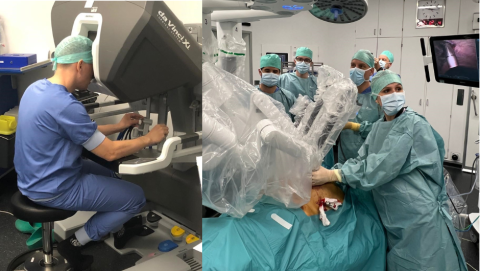Robotic surgery for bariatric procedures

Two robotic obesity surgeries (bariatric surgery) were carried out on the St-Elisabeth site. One by Dr Yannick Nijs and the other by Dr Marc Vertruyen using the "Da Vinci Xi robot", with the help of Dr Christophe Assenmacher and Dr Gregoire Assenmacher.
Bariatrics, also known as bariatric surgery or obesity surgery, is a branch of medicine concerned with the research and treatment of obesity. The term comes from the Greek "baros" (weight) and the suffix "iatros" (doctor).
We put a few questions to Dr Yannick Nijs, abdominal surgeon at the St-Michel site:
Is this a first for our hospital or our country?
Dr Yannick Nijs: "Robotic surgery in bariatric surgery is already used in our country, but not yet in very many establishments. For the Europe Hospitals, however, this is a first in the use of robotic surgery in bariatric surgery. However, robotic surgery has been used in urology at the Europe Hospitals for many years by Dr Christophe Assenmacher, Dr Grégoire Assenmacher and Dr Jan Benijts. Prof. Nouredin Messaoudi has also been using the robot for some time for hepatobiliary surgery."
What are the advantages of robotic surgery over conventional surgery?
Dr Yannick Nijs: "The big advantage as a surgeon is that you have a better view of the operation. The 3D images give you the impression of being, so to speak, inside the patient's body. Another equally important advantage is that you can work much more precisely, because the robot adjusts certain actions in greater detail, dissects tissues more precisely and eliminates the surgeon's natural tremor, for example. What's more, you can make movements with the robot's arms that are impossible with human anatomy. For example, human hand movements are limited, whereas the robot can move in all possible directions inside the patient's body with its arms inserted."
Are there benefits for the patient too?
Dr Yannick Nijs: "Patients experience much less pain after the operation. Rehabilitation takes place much more quickly, which also means a shorter hospital stay."
For which procedures can patients opt for this type of surgery?
Dr Yannick Nijs: "This decision is always taken in consultation with the patient, which is crucial for mutual trust. All procedures are possible in both directions, i.e. using both conventional surgery and the robot. For complex procedures such as bypass, sleeve or colorectal procedures, the robot is preferred."
Is an operation with the robot faster or slower?
Dr Yannick Nijs: "The procedure with the robot generally takes as much time as a conventional laparoscopic operation. The time you save during the operation with the robot, you lose a little during the installation of the robot before you can start the actual operation. Experienced surgeons will be able to install the robotic arms more quickly, but you shouldn't do it to save time."
What was it like being a surgeon for the first time?
Dr Yannick Nijs : "For me, as a surgeon, it requires a new learning process that forces you out of your comfort zone. It's a bit like going back to the days when you were an assistant in training, but you're well supported at the beginning by people from the company. There are also plenty of safety mechanisms built into the robot, so you don't have to worry about anything going wrong in terms of technology with this device. I was also able to do a lot of training beforehand using a simulation programme. And I have to say that these exercises were also useful for conventional surgery, because you learn a lot for this type of operation too."
Are there any other future plans for bariatric surgery at the Europe Hospitals?
Dr Yannick Nijs: "Robotic surgery is definitely the future. The new generation of robots that will soon be on the market will become even better, and it won't be long before artificial intelligence is applied to this equipment. Robots will be used more and more, particularly for complex operations. In Europe, we are a little behind America in this respect, where there are already many and almost mainly robotic operations. So this is also the future of bariatric surgery, and we will certainly be following suit at the Europe Hospitals."

